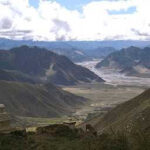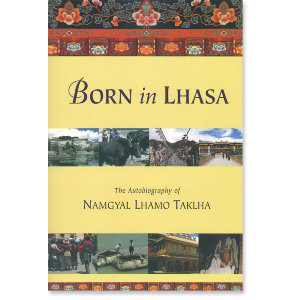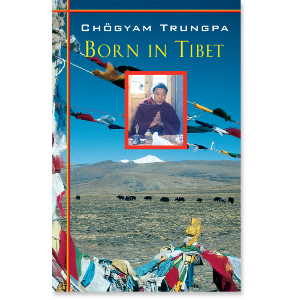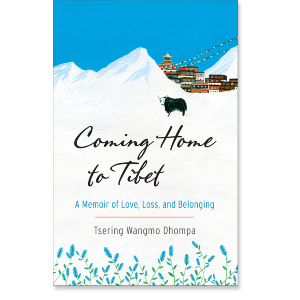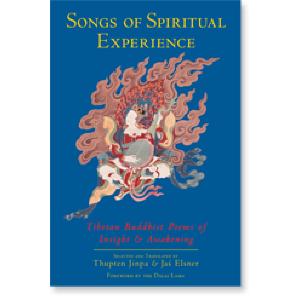| The following article is from the Winter, 1994 issue of the Snow Lion Newsletter and is for historical reference only. You can see this in context of the original newsletter here. |
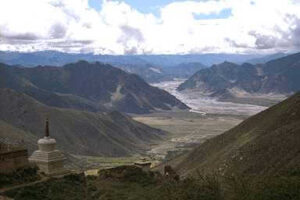
From the Human Rights Desk, Central Tibetan Administration, Dharamshala, Dec. 22, 1993
Since spontaneous resistance to Chinese rule erupted in Tibet in September 1987, sparked off by China-controlled media criticizing the Five Point Peace Plan for Tibet outlined by His Holiness the Dalai Lama on September 21 in Washington, D.C., 178 peaceful independence demonstrations have taken place in Lhasa up to August 1993. Of these at least one-third were led by nuns.
Ani Kalsang Pelmo (age 27) of Shungseb Nunnery, located 45 km southeast of Lhasa, was a monastic activist leader until her arrest in May 1988. She was tortured, sexually abused and finally, in 1990, expelled from Shungseb by the Chinese authorities along with 43 fellow nuns.
Today she lives, studies and practices with 48 former Shungseb nuns at the new Shungseb Nunnery in Dharamshala. Her experiences are common like many other nuns now in prison in Tibet or living in exile in India. She tells her own story.
I became a nun in 1985 and began my religious training by working on the renovation of Shungseb Nunnery. Later I was admitted to this nunnery on the condition that I provided my own food and clothing. We had around 200 nuns.
In January and March 1988 five of us nuns launched wall-poster campaigns to protest against the continued persecution of our people by the Chinese. The Chinese made every effort to ferret out the authors of these posters, but they did not succeed.
On May 15, 1988 nine of our nuns and two monks from Ganri Thokar held a secret meeting and decided to stage a protest march calling for Tibetan independence and the release of Tibetan political prisoners. We vowed that we would keep our activities peaceful, as advised by His Holiness the Dalai Lama. We pledged that if any of us were arrested and interrogated, no one would divulge the identity of the others, even on pain of death. We also took an oath to sacrifice everything, including our lives, for the cause of our nation and religion, then, one by one, we secretly left our nunnery.
On May 17, 1988, we met in front of the Jokhang temple and began the demonstration at about 10 AM. We made three circuits of the Jokhang, shouting slogans. We were about to complete the third round when Chinese armed police arrived in trucks and arrested us. They were heavily armed.
The police forced us onto trucks and ordered us to stand with our hands raised in the air. But while the trucks journeyed towards the prison we kept shouting slogans. This really infuriated the Chinese Public Security Bureau police, who began beating us with truncheons, rifle butts, etc. Some were kicking us. A monk bled profusely; he was seriously hurt by the assault.
We were taken to Lhasa's Gutsa prison. Chinese guards registered our names, plus the names of our nunneries and monasteries. Then they took our photos and began interrogating us individually.
I was asked the names of the ringleaders. I replied that we were all ringleaders. When I refused to say anything more, they brought a dog to attack me. Fortunately I was wearing thick robes that day, so the dog could only injure my ankles and shoulders.
They then took me to another room where an officer kicked me several times. He also hit me in the face with a flat shiny object. Whatever that object was, it caused unbearable pain. He kept on hitting me with this thing until he himself was exhausted. My face became swollen. They searched me once again and then handed me over to a woman officer.
The woman took me to another room where she made me take off all my clothes. I was ordered to lie prone and beaten with truncheons from head to heels. Then I was made to stand up and jabbed with a stick into my private parts. They did this in full view of some male prisoners who were watching from two windows.
Then a Chinese officer took out an electric cattle prod and jabbed it into my private parts. I felt overwhelmingly embarrassed, ashamed and humiliated. The pain was so great that I nearly lost consciousness. Finally, they dragged me into another cell, still naked.
At around midnight I was called for re-interrogation. There were three Chinese and two Tibetan officers. I continued to stand by my earlier statements. They became angry and made me lie down an stomped on my body. Then they brought a chair and made me squat, balanced on my toes with my chin resting on the chair. Every time I fell they beat me. This went on for quite a while. After that, five prison guards came and kicked me around with all their might. They twisted my arms behind me. I lost consciousness.
The next morning I found myself alone in a cell. There was blood on my face and my whole body was in excruciating agony.
During the following ten days my urine was red with blood. Some time later, two female doctors came to see me. I showed them my body and told them of the pain I was suffering. Instead of giving me medical care the doctor slapped me across the face and walked off. I had no food on that or the previous day.
On the third day I was again taken for interrogation and was beaten, once more.
After two months in captivity I was released along with the other Shungseb nuns. Although the Chinese ordered us to go straight to our nunnery, I went to the hospital for treatment. After a month in the hospital, the Chinese forced me to leave for my nunnery.
When I reached there I discovered that the Chinese had begun daily re-education sessions to indoctrinate our nuns about the virtue of the communist system and to try to convince us that Tibet is an inalienable part of China. The nuns were ordered not to follow the few splittists headed by the Dalai Lama. The abbess and administrators of the nunnery were warned that they would be held responsible for any future demonstrations by our nuns. This went on for two months.
In October 1989, nine Chinese came to our nunnery and stayed there to re-educate us till January 1990. While they were there it was not possible for us to pursue our religious activities. All prayers composed by His Holiness the Dalai Lama were banned.
Then on February 11, 1990 the Chinese expelled 43 nuns, including myself, from Shungseb. We were handed over to the district authorities with this order: henceforth we should not undertake any religious activities; we should stay home and work in the fields; all nunneries were banned from admitting us.
On reaching my home in Lhoka, south of Lhasa, I found my mother ailing. She had been made to stand naked on ice for three days for shouting slogans criticizing the lack of religious freedom in Tibet. My sister, Gyaltsen Choenyi, had served a nine-month term in Gutsa prison for taking part in the March, 1988 demonstration. I decided that I must escape and tell the world what the Chinese are doing to our people. I left home by lying to my parents that I was going to Shungseb to collect my remaining belongings.
I went straight to Lhasa, collected some money and made for Mount Kailash in western Tibet. From there, I escaped to Nepal with five nuns and eight monks. We wore lay clothes and reached Dharamshala on August 21, 1990.

